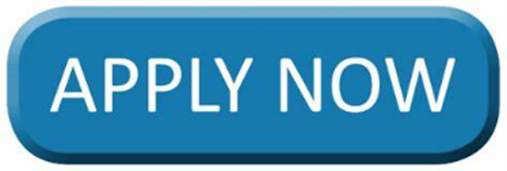Compass
UCI - CIRM COMPASS Scholarship Program
Creating Opportunities through Mentorship and Partnership Across Stem Cell Science (COMPASS) Scholars Research Program in Regenerative Medicine Careers for a Diverse Undergraduate Population
Applications are due by Monday, February 23rd at 11:59 PM.
Who is CIRM?
California Institute of Regenerative Medicine (CIRM) Stem Cell Agency’s mission is to accelerate world class science to deliver transformative regenerative medicine treatments in an equitable manner to a diverse California and world. CIRM is committed to tackling these challenges by creating a diverse and dedicated workforce that can meet the technical demands of translating novel treatment paradigms to reality, while engendering the necessary appreciation for and sensitivity to the perspectives and participation of communities that have been historically under-represented in the biomedical sciences.
About the UCI Program
UCI’s “ CIRM COMPASS Scholar’s Program ” will train 1st generation and under-served students, including undeclared majors and/or those at risk of dropping out of college, undergraduates for a range of careers in regenerative medicine. These Scholarships are open to freshmen and sophomores only. COMPASS Scholars will be paired with a faculty mentor after their sophomore year and be supported for 2 full years with more than $70,000 in tuition, fees, a stipend, summer housing on campus, and a research allowance. COMPASS Scholars need to commit to a two-year program and to live on campus during summer of their first and second year in the program, where they will learn hands-on lab skills, human stem cell culture, an introduction to good manufacturing procedures (GMP), and earn a certificate in Clinical Research Coordination (CRC) and a Good Manufacturing Practices (GMP) Facilities Operations Training Program certificate. These skills are highly desired in the biotech job market. UCI will host 5 Scholars a year over the 5-year program (25 Scholars).
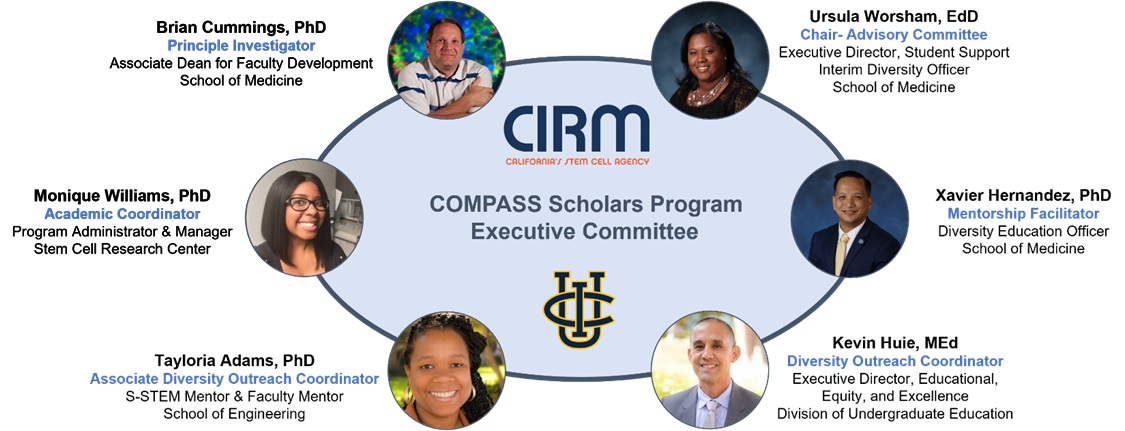
UCI’s experience with first-generation and under-served students across multiple CIRM Bridges programs documents that these students progress to successful careers in regenerative medicine and that the vast majority of Bridges Interns remain in the state of California. We believe our COMPASS Scholar’s Program will prepare a diverse cadre of undergraduates for careers in regenerative medicine, targeting untapped talent within populations that are historically underrepresented in the biomedical sciences. By teaching general research, networking, and communication skills, and combining these skills with hands-on training in stem cell biology and public outreach, we will be providing California with a well-trained workforce of COMPASS Scholars ready for successful careers in biotech, public health, regulatory affairs, and regenerative medicine.
Further, a graduation gap exists between first-generation and under-served undergraduates and their second-generation or more socioeconomically stable peers. UCI’s accountability office calculated that this graduation rate gap means that students graduating in four years as opposed to six years will have between $100,000 to $150,000 in reduced educational expenses and additional wages compared to those who take 6 years to graduate. We expect that the majority of our COMPASS Scholars will graduate in four years, saving themselves and their families via reduced college costs and loans as they begin careers in high-paying jobs with excellent pathways to further growth.
An important goal of this program is opening new career pathways for UCI students. Our program will give Scholars the opportunity to explore a variety of ways in which their research skills can be applied toward improving human health through career paths in both the public and private sectors. There are shortages of individuals skilled and trained in stem cell manufacture and good manufacturing procedures (GMP) (average salary of $68,940); there are shortages of Clinical Research Coordinators (CRCs) (average salary of $75,726) who help establish clinical trials and enroll/track patients in those trials. The more diverse these individuals are, the better they will connect with a diverse patient population and bring a wider range of patients into the clinical trial pipeline. The COMPASS Program will produce well-trained individuals ready to contribute to the workforce.
The Sue & Bill Gross Stem Cell Research Center (SCRC)
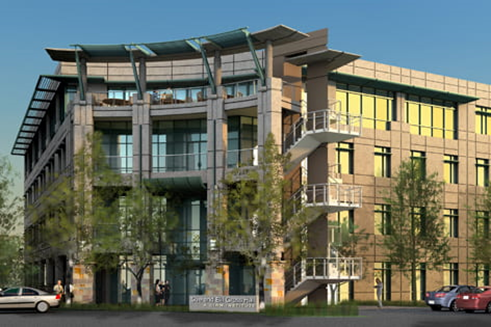
The SCRC consists of more than 60+ science faculty across the campus who can mentor COMPASS Scholars; more mentors will be added in the next years. Activities within the SCRC include basic and translational stem cell research using multidisciplinary approaches, such as cell biology, genomics, computational biology, bioengineering, pre-clinical development, and clinical applications/practice. Faculty members have taken a bench-to-bedside path to various preclinical and clinical development stages.
Our mentors have all had Implicit Bias and Culturally Aware Mentorship training. Activities within the Center Faculty are also engaged in understanding the stem cell field in the wider context of health disparities and ethics fostering the capability of Scholars to act as ambassadors for the regenerative medicine field in society at large. There are training and research opportunities across a wide range of topics including new cell sorting and manufacturing methods, biomaterials to control cellular development, 3D cell culture and fused organoids, health disparities, bioethics, and upcoming trials for retinal repair, brain injury, stroke, ALS, and Huntington’s disease.
Program Requirements
All COMPASS Scholars must complete within the two year award period: 1) attend a 10-week intensive summer research training bootcamp, 2) enroll in at least one regenerative medicine and/or scientific method undergraduate course, one on public health disparities, and one in sociology, political science, or health bioethics, 3) enroll for 3-5 units in BIO 199 (or equivalent mentored research) for 6 quarters (approximately 420 hands-on hours) across the two years of scholarship support, 4) complete Clinical Research Coordination (CRC) and good manufacturing practice (GMP) certificate training program in their second summer, 5) attend ancillary activities surrounding community outreach, patient advocacy, and public health engagement, and 6) culminating in a Capstone Project.

Two-year matriculation through UCI’s COMPASS program. Scholars are selected in the Spring, receive general lab training, microscopy, culture of human cells, and intro to cGMP in the summer, then take BIO199 (or equivalent - mentored research) the following year. The second summer includes CRC training, regulatory affairs, and BIO199 work. Scholars enroll in BIO199 all quarters of their second year, culminating in a Capstone Project.
Additionally, the Scholars will receive training in the responsible conduct of research, preparation of individual development plans (IDPs) with their mentor, Diversity Equity and Inclusion 101, public speaking skills and elevator pitches, meetings with patients and patient advocates, attendance at Stem Cell Research Center scientific presentations, and helping host the Center’s Public Seminar Series. Scholars may also host high school students during the seminars and help manage the audience and field questions. The Capstone Project can be either (A) an Excellence in Research presentation, (B) an Excellence in Research paper, or (C) a presentation of their internship results at an annual conference, in parallel with a CIRM Bridges conference, or via a half day conference hosted at UCI’s SCRC.
The Current COMPASS Cohorts
2023-2025 Cohort (from left to right):
- Jennalyn Robeniol joined Leigh Turner’s lab and Victoria Sahrai is her past graduate student Co-mentor.
- Ruben Gonzalez joined Momoko Watanabe’s lab and Yuan Chen Tsai is his Postdoc Co-Mentor.
- Jose Cardenas Zuno joined Craig Walsh’s lab and Sarah Lee is his graduate student Co-mentor.
- Alyssa Villegas joined Aileen Anderson’s lab and Pooja Sakthivel is her graduate student Co-mentor.
- Masai Dumisani joined Lisa Flanagan’s lab and Nini Liu is her graduate student Co-mentor.
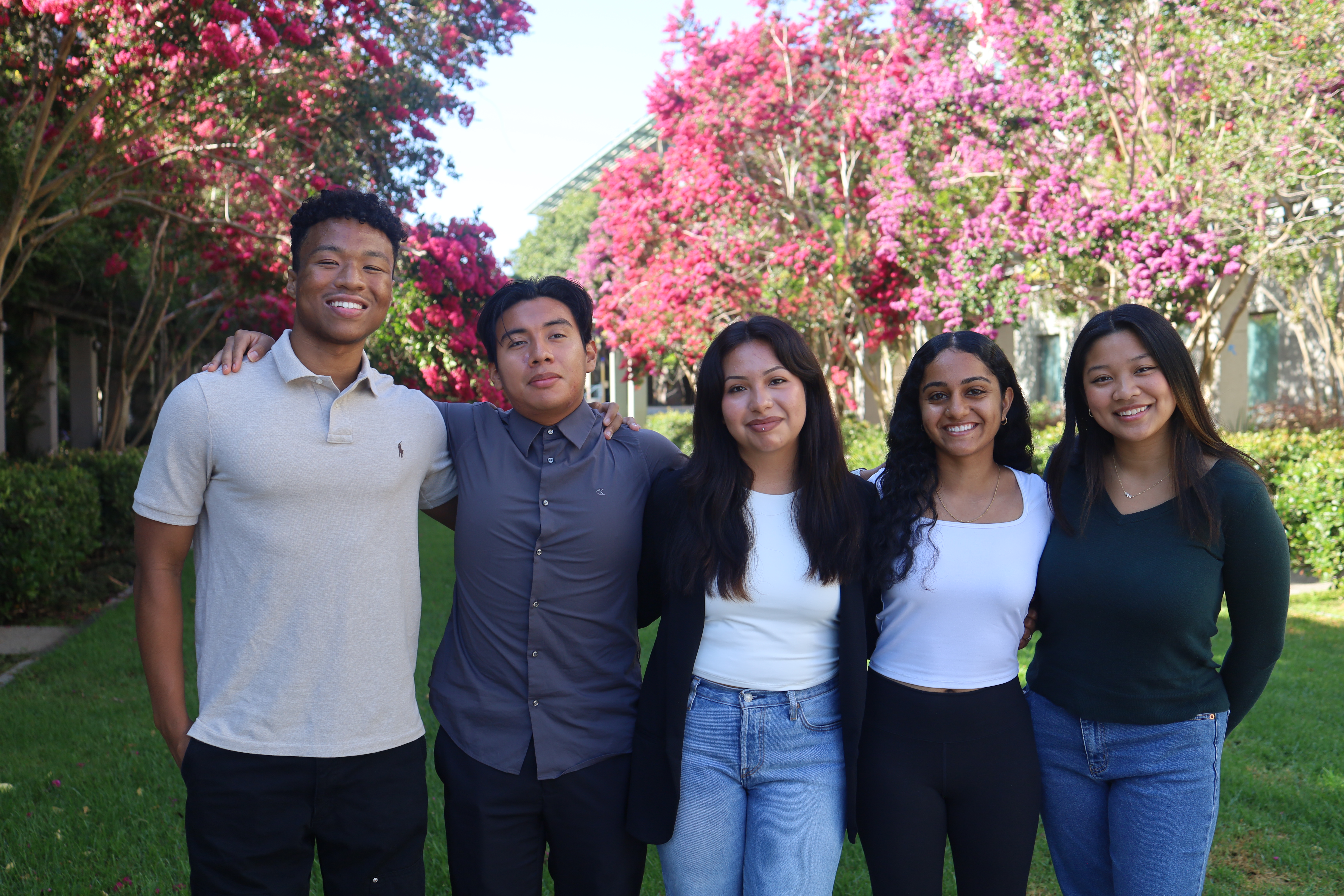
2024-2026 Cohort (from left to right):
- Brandon Ilori joined Herdeline “Digs” Ardoña’s lab and Yuyao Kuang & Natalie Celt are his Co-Mentors.
- Isidro Sanchez joined Edwin Monuki’s lab and Victoria Espericueta and Brett Johnson are his graduate student & lab manager Co-mentors.
- Stephanie Jimenez joined Devon Lawson’s lab and Hannah Savage is her graduate student Co-mentor.
- Navnit Kaur joined Leslie Thompson’s lab and Jharrayne "Jhay" McKnight & Niki McClure are her Co-mentors.
- Alexii Villamar joined Matt Inlay’s lab and Angel Ayala is her graduate student Co-mentor.
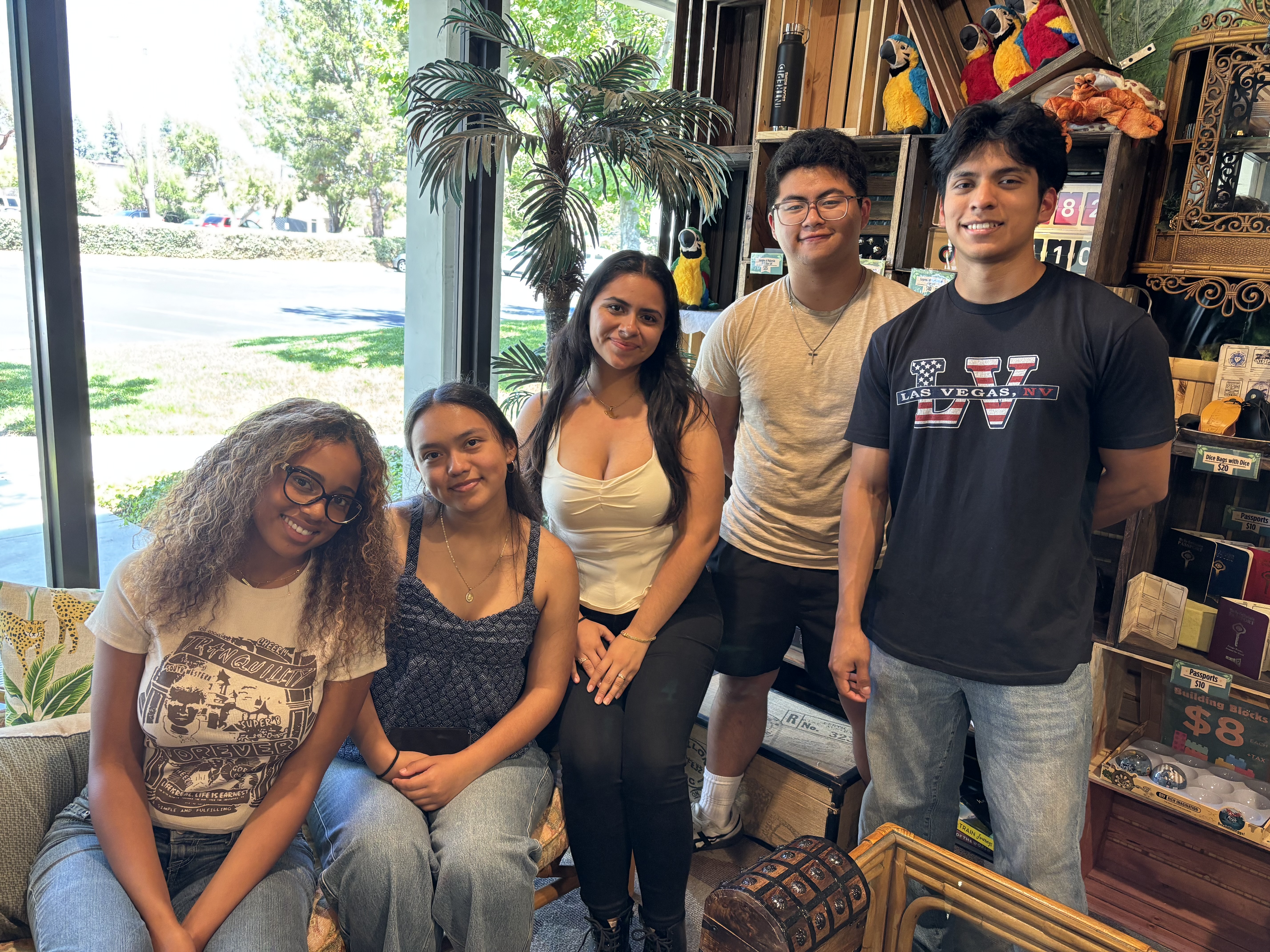
2025-2027 Cohort (from left to right)
- Sasha Hayes-Pleasant joined Leigh Turner’s lab and Jennalyn Robeniol (former 2023-2025 COMPASS Scholar) is her Co-mentor.
- Iceis Hurtado joined Brian Cummings’ lab and Dr. Josh Karam is her postdoctoral Co-mentor.
- Katherine Montalvo Reglado joined Wendy Liu’s lab and Daniela Enriquez Ochoa is her graduate student co-mentor.
- Rylan Rubiono joined Aileen Anderson’s lab and Zeina Elrachid is his graduate student co-mentor.
- Wilbur Santiago Perez joined Munjal Acharya’s lab and Casey Hudson is his graduate student co-mentor.
What do CIRM Scholars get?
- Up to $70,000 in support over two years,
- Partial tuition and fee coverage - up to $9,600 depending on your current financial aid package
- Monthly stipend during the academic year - up to $9,000 for the year, depending on your current financial aid package
- Summer internship stipend & summer housing - Summer stipend is up to $9,000
- Funds for research supplies (which go to their host lab) - a total of $2,200 given to the Scholar’s host lab for the two-year period.
- Travel award - a total of $1,000 for the two-year period.
- Paired with and individual faculty mentors and postdoc/graduate student co-mentors for one-on-one training and support.
- Competitive Training Certificate in Clinical Research Coordination (CRC) and a Good Manufacturing Practices (GMP).
- Hands-on experience and training in:
- laboratory techniques
- microscopy
- cell culture
- biotech manufacturing
- regulatory affairs
- public and scientific presentation skills
- specialized learning through selected didactic courses
What is expected of CIRM Scholars?
- This program is open to freshmen and sophomores and requires a two-year commitment.
- Scholars will participate in all program-sponsored events.
- Live on campus during 10-week summer sessions (of 2025 and 2026).
- Enroll as a BIO 199 (or equivalent) for 6-quarters during the academic year.
- Complete an Excellence in Research (or equivalent) Capstone Project.
- Enroll in courses in regenerative medicine and/or scientific method, public health disparities, and sociology, political science, or health bioethics.
- Attend ancillary activities surrounding community outreach, patient advocacy, and public health engagement including attendance at Stem Cell Research Center scientific presentations and helping host the Public Seminar Series.
Required Application Documents
- Completed application form – Click the “Apply Now” icon below to access the online application.
- Copy of Unofficial Transcript (PDF preferred)
- Resume (optional) (Word or PDF preferred)
Applications are due by February 23rd at 11:59 PM, we will confirm our cohort early April 2026.
If you have any questions about the program, please contact
Dr. Brian Cumming (cummings@uci.edu) or Dr. Monique Williams (monique.williams@uci.edu)
